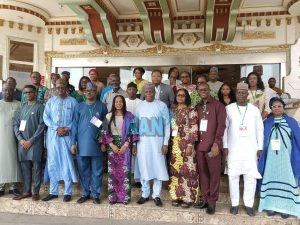
Participants at a ta two-day workshop geared towards advancing genome editing technology, in Abuja on Thursday
By Sylvester Thompson
The African Union Development Agency(AUDA-NEPAD) Centre of Excellence in STI, hosted a two-day workshop geared towards advancing genome editing technology as a tool to drive agricultural productivity in Nigeria.
The workshop organised for Chief Executives and Experts in Research and Academic Institutions, declared open by Dr Adeleke Mamora, Minister of Science, Technology and Innovation (STI), ended in Abuja on Thursday.
Mamora said Nigerias agricultural sector was facing many challenges such as poor land tenure system, low level of irrigation farming, climate change and land degradation, among others, impacted on its productivity.
All these challenges have stifled agricultural productivity and affected the sectors contribution to Gross Domestic Product (GDP), he said.
Represented by Mrs Monilola Udoh, Permanent Secretary of the ministry, Mamora stated that genome editing technology had the potential to revitalise agricultural productivity, promote food security and sustainable environment in Nigeria.
He said that the AUDA-NEPAD initiative on genome editing technology focused on innovation, building research and development capacities towards commercialisation of genome edited agricultural products for improved livelihood was timely.
The hosting of an AUDA-NEPAD genome editing research project in NABDA will position Nigeria to take a leading role in driving the technology while building required manpower and infrastructure, the minister said.
Prof. Abdullahi Mustapha, Director-General of the National Biotechnology Development Agency(NABDA), said the workshop was another important step by the centre in addressing the problems of different sectors of the economy particularly agriculture.
Mustapha said: As you may be aware, AUDA-NEPAD Centre of Excellence in STI (CoE-STI), had embarked on awakening the consciousness of the continent to the latent potential of this revolutionary tool in the last few months.
He disclosed that precisely, formal engagements with NABDA started in Oct. 2022 and that the agency was pleased with the level of engagement and commitment of AUDA-NEPAD in STI in Nigeria and across the continent.
The NABDA D-G said that as Captains of various institutions, the meeting would afford the opportunity to share experiences and compare notes, appreciate strengths and challenges in order to chart a clear road map.
Mrs Florence Nazare, acting Director of Knowledge Management and Programme of the AUDA-NEPAD, in an interview with the News Agency of Nigeria (NAN) on the sidelines of the workshop, said research and development required adequate resources.
She said the project basically looked at a sustainable financing model, urging that governments should commit more resources from their budgets to drive research and development.
Nazare said that it was important for Africa to domesticate genome editing technology which was important for industralisation and improved livelihoods of African citizenry.
The Director added that apart from government and scientists, they were also working with the private sector and also looking at the model of carrying out research on products of national interest.
She said synergy as the core contract for good and collaborative partnership between the states, private sector, research institutions and scientists was very important.
Nazare said though the AUDA-NEPAD was advancing biotechnology, but safety of the product was also their concern, hence the issue of bio-security and bio-safety was primary.
We also need our scientists that work in the regulatory space to be capacitated to be able to ensure that we can guarantee safety for African citizens, she said.
Prof. Olalekan Akinbo, Supervisor at the Centre of Excellence in STI, AUDA-NEPAD, also in an interview, said that the African Union was working on Agenda 2063 and the focal point was zero-hunger.
He said genome editing technology was an innovation that helped in precision agriculture, adding that the benefits included among others, reduction in time frame to grow or bring up a product.
According to him, genome editing has the ability to address challenges that could not be addressed in conventional breeding, by way of improving agriculture.
Akinbo assured that the technology could provide solution that would meet the teeming population of people, offering benefits that would enhance and get the product to farmers within the shortest time.
Dr Shakirat Ajenifujah-Solebo, acting Director, Genetics and Bioinformatics Department of the NABDA and Desk Officer for the AUDA-NEPAD project, said the workshop afforded CEOs and experts opportunity to define their terms of engagement.
She said this had to do with how they intended to work together in order to ensure that Nigeria benefits from this technology.
Its very important that we come together under the platform of the AUDA-NEPAD project which is not only for genome editing in Nigeria but also for the African continent, Solebo said.
The two-day workshop witnessed presentations by various Chief Executives and Experts in Research and academic Institutions. .(NAN)()
================
Edited by Bashir Rabe Mani
Source: NAN News